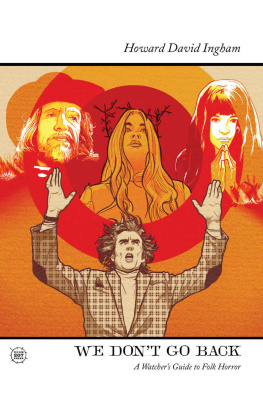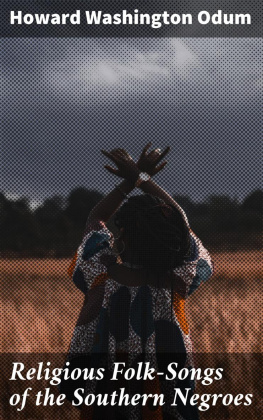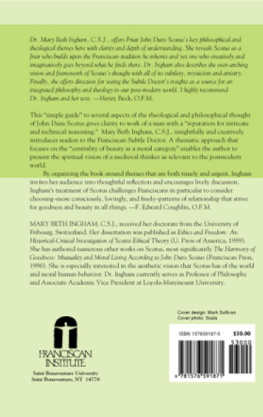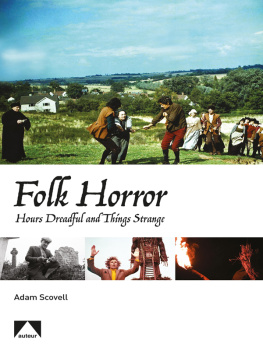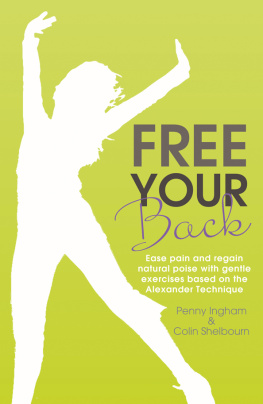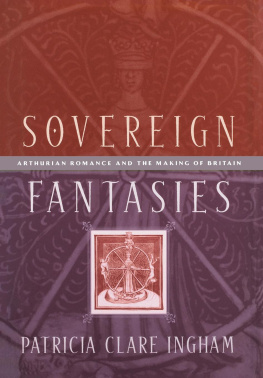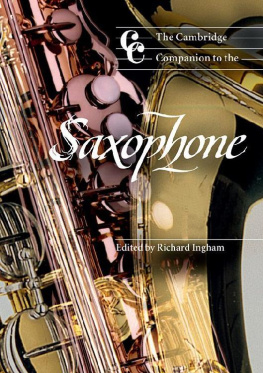Ingham Howard David - We Dont Go Back: A Watchers Guide to Folk Horror
Here you can read online Ingham Howard David - We Dont Go Back: A Watchers Guide to Folk Horror full text of the book (entire story) in english for free. Download pdf and epub, get meaning, cover and reviews about this ebook. year: 2018, publisher: Room 207 Press, genre: Detective and thriller. Description of the work, (preface) as well as reviews are available. Best literature library LitArk.com created for fans of good reading and offers a wide selection of genres:
Romance novel
Science fiction
Adventure
Detective
Science
History
Home and family
Prose
Art
Politics
Computer
Non-fiction
Religion
Business
Children
Humor
Choose a favorite category and find really read worthwhile books. Enjoy immersion in the world of imagination, feel the emotions of the characters or learn something new for yourself, make an fascinating discovery.
- Book:We Dont Go Back: A Watchers Guide to Folk Horror
- Author:
- Publisher:Room 207 Press
- Genre:
- Year:2018
- Rating:4 / 5
- Favourites:Add to favourites
- Your mark:
- 80
- 1
- 2
- 3
- 4
- 5
We Dont Go Back: A Watchers Guide to Folk Horror: summary, description and annotation
We offer to read an annotation, description, summary or preface (depends on what the author of the book "We Dont Go Back: A Watchers Guide to Folk Horror" wrote himself). If you haven't found the necessary information about the book — write in the comments, we will try to find it.
We Dont Go Back: A Watchers Guide to Folk Horror — read online for free the complete book (whole text) full work
Below is the text of the book, divided by pages. System saving the place of the last page read, allows you to conveniently read the book "We Dont Go Back: A Watchers Guide to Folk Horror" online for free, without having to search again every time where you left off. Put a bookmark, and you can go to the page where you finished reading at any time.
Font size:
Interval:
Bookmark:
We Dont Go Back
A Watchers Guide to Folk Horror
A beautiful rumination on the dark films and television that shaped me and a generation of odd children, for good or ill, worth a year of your time, because you wont just read the book, youll feel a burning desire to watch everything mentioned within.
Robin Ince, The Infinite Monkey Cage (BBC)
A comprehensive, accessible and often riotously funny tome weaving together folk horror in all its forms, from British television to the American backwoods, from Eastern European fairytales to the vengeful ghosts of East Asia. Ingham explores uncanny landscapes haunted by things buried, old cultures converging with the reluctance of contemporary reason, that very tension that gives his book its name. He attempts to both define folk horror and free it from definition, creating the ultimate guide to the genres manifestations on film and offering a convincing argument as to why the genre resonates so compellingly with people today.
Kier-La Janisse, author of House of Psychotic Women
By the same author:
The Age of Miracles: Essays on the Collapse of History
this is not a picture
Chariot
The Shivering Circle
Room 207 Press Watchers Guides (coming soon):
On a Thousand Walls ~ A Watchers Guide to the Urban Wyrd
Cult Cinema ~ A Watchers Guide to Bad Religion in Film
The Question in Bodies ~ A Watchers Guide to Identity Horror
Your Move, Darwin ~ Watching the Planet of the Apes
We Dont Go Back
A Watchers Guide to Folk Horror
Howard David Ingham
Illustrated by Steven Horry
with additional material by
Jon Dear, Monique Lacoste, Simeon Smith and Daniel Pietersen

Copyright 2018 Howard David Ingham
except for:
The Company of Wolves essay (p133) 2018 Monique Lacoste;
The Turin Horse essay (p375) 2018 Daniel Pietersen;
Pans Labyrinth essay (p159) 2018 Simeon Smith;
essays on The Woman in Black (p211), Duel (p271),
The Wailing (p354) and The Borderlands (p398) 2018 Jon Dear
~
The original drafts of the essays in this book were written between October 2016 and July 2018, and published at Room207Press.com , apart from the essay on Bella in the Wych Elm (p221), which is a revised form of a post which appeared in 2017 at
folkhorrorrevival.com .
~
All rights reserved. No part of this publication may be reproduced, distributed, or transmitted in any form or by any means, including photocopying, recording, or other electronic or mechanical methods, without the prior written permission of the publisher, except in the case of brief quotations embodied in critical reviews and certain other noncommercial uses permitted by copyright law.

Room207Press.com
Swansea, United Kingdom
Contents
Introduction: Cooking the Spooks
A story: in February 1976, Gordon Higginson, President of the Spiritualists National Union, appeared in the British United National Spiritualist church, Grosvenor Road, Bristol, to give a demonstration of his powers. By all accounts, this was pretty spectacular: he was even able to tell attendees their phone numbers and addresses. When Phyllis Simpson, secretary of the church, wrote to the SNU to point out that everyone Higginson had read was a member of her church, and to allege that Higginson had insisted on being left alone in the church for an hour before the meeting, and had access to the church office, and, presumably, the church directory. This controversy tore apart the Bristol church and the affair threatened to do the same with the SNU itself. It took two years of bitter controversy within the spiritualist movement (and in the wider esoteric community it was a fixture in the pages of Prediction , for example) before the affair was settled.
By the time the SNU had their tribunal, it had been reported in at least three national newspapers. And this is the interesting bit: the stories in these 1970s papers always assume that a reader probably had a better-than-zero chance of knowing who Higginson was. Not so much that he was what youd call a household name, but enough that he only needed a brief introduction. And all of the stories, especially one from the Daily Express in February 1978, carry no explanation whatsoever of the mechanics of mediumship. In 1978, a paper like the Daily Express assumed that you knew what a spiritualist medium is and does.
In fact, Spiritualism in the UK had already begun a slow decline. Falling numbers led to financial losses, and the decline has been so far irreversible the SNU has just over 2700 members nationwide now, compared to the tens of thousands it had in the 1970s .
But in 1978 spiritualism was still something that was present in our popular culture. It was an everyday thing. You didnt necessarily know a medium, but it was almost certain you knew someone who knew one. It was in the air. The uncanny was inextricably tied with the prosaic.
It is around that pop cultural phenomenon across the 70s that the most concentrated expression of British folk horror came.
We Dont Go Back (except when we do)
Towards the end of October 2016, I had reached something of a dead-end with my blog, and I thought, I know! Ive got this copy of The Witch sitting here and I could spend a few days going through some of the other stuff I never got round to watching and its years since I had a Halloween movie binge, and hell, why not write about it? I had a copy of The Wicker Man Id found in a record sale in 2010 that Id never watched; a copy of Beasts that cost me 50p at a second-hand stall at a Summer Fayre. I last watched Simon Magus before I had kids, and now my oldest had just turned 11. I needed to do this.
I planned my viewing carefully. It was just going to be a diversion between big projects, something to go alongside a project I was doing on the pop culture Atlantis stuff.
Id just discovered that folk horror had a fandom. And that half of my favourite films and TV shows were, apparently, folk horror. My DVD shelf was already pretty stocked with it. The Witch. Valerie and Her Week of Wonders. Ghost Stories for Christmas. Carnival of Souls. Loads of 1970s Doctor Who.
What the hell , I thought.
It rapidly spiralled out of control.
I kept finding new films and TV shows to watch. I kept finding more to say, more to think about. The blog began to be about the films. And people started to respond. People liked it. So it continued. And here we are.
I called my project We Dont Go Back , after a line in Murrain (p44), the end of an exchange in which reason faces off against the old ways, pagan superstitions, old beliefs. We investigate. We divine the rules, discard the old, and make new rules. But we dont go back. And of course its wrong: because if we dont, we lose. And if we do, we lose.
It seems to me to be the line that defines the tension of folk horror, the thing that makes it horror. Out in the isolated places unusual superstitions flourish, and these are the places we came from. The old places. Even if the old gods have died, theres something about these ancient geographies that makes new gods flourish where the old once reigned. The old grounds, lain fallow, are fertile for this sort of thing. But we dont go back. That way leads to madness.
Adam Scovell, in his book Folk Horror: Hours Dreadful and Things Strange (2017) has the most rigorous and useful definition of folk horror I have seen. Folk horror, Scovell says, has a sense of place, and the story is influenced heavily by its location; and this place, which is evocative in its own right, is isolated; the isolation leads to a skewed moral compass, or unusual beliefs, and the combination of all three of these isolation, landscape and weird morality leads to a summoning, or a happening. This is a Folk Horror Chain, and its the most useful metric of what is, frankly, not an easy genre to define.
Next pageFont size:
Interval:
Bookmark:
Similar books «We Dont Go Back: A Watchers Guide to Folk Horror»
Look at similar books to We Dont Go Back: A Watchers Guide to Folk Horror. We have selected literature similar in name and meaning in the hope of providing readers with more options to find new, interesting, not yet read works.
Discussion, reviews of the book We Dont Go Back: A Watchers Guide to Folk Horror and just readers' own opinions. Leave your comments, write what you think about the work, its meaning or the main characters. Specify what exactly you liked and what you didn't like, and why you think so.

